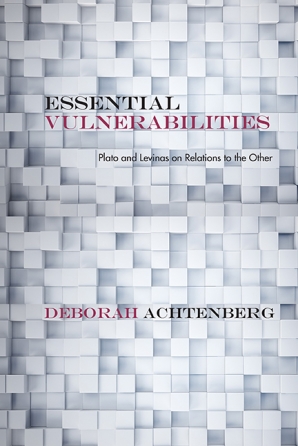PHILOSOPHY / Ethics & Moral Philosophy
Showing results 1-10 of 12
Filter Results OPEN +

The Matter of Evil
Overturning our assumptions about the nature and value of reality, The Matter of Evil presents a provocative new model of ethical responsibility that is both logically justifiable and scientifically sound.
Levinas on the Primacy of the Ethical
Studies in Phenomenology and Existential Philosophy
Jeffrey Bloechl traces the evolution of Levinas’s thought to argue that his conception of God is dependent on his existential phenomenology.
For an Ontology of Morals
For an Ontology of Morals: A Critique of Contemporary Ethical Theory assesses contemporary trends in ethical theory, including the deontological tradition dating back to Kant, the teleological...
Essential Vulnerabilities
In Essential Vulnerabilities, Deborah Achtenberg contests Emmanuel Levinas’s idea that Plato is a philosopher of freedom for whom thought is a return to the self. To the contrary, she agrees, Plato, like Levinas, is a philosopher of the other. While they share the view that human beings are essentially vulnerable and in relation to others, they conceive human vulnerability and responsiveness differently.
The Gift of Active Empathy
Studies in Russian Literature and Theory
This innovative study brings the early writings of Mikhail Bakhtin into conversation with Max Scheler and Fyodor Dostoevsky to explore the question of what makes emotional co-experiencing ethically and spiritually productive.
Nietzsche and the Shadow of God
Studies in Phenomenology and Existential Philosophy
In Nietzsche and the Shadow of God (Nietzsche et l’ombre de Dieu), his study of Nietzsche’s integral philosophical corpus, Franck revisits the fundamental concepts of Nietzsche’s thought, from the death of God and the will to power, to the body as the seat of thinking and valuing, and finally to his conception of a post-Christian justice.
The Ethics of History
Topics in Historical Philosophy
What is implied by "ethics of history"? The authors of this volume, internationally renowned philosophers and intellectual historians, address this question in all its novelty and ambiguity and develop varied perspectives on the place and nature of ethics in the philosophy, enterprise, and practice of history.
Discovering Existence with Husserl
Studies in Phenomenology and Existential Philosophy
Contemporary philosophers are increasingly turning to the work of Emmanuel Levinas to bring a consideration of ethics into their own thinking. As an exponent of the phenomenological tradition, Levinas ranks with Heidegger and Sartre; as a disciple of Husserl, he was one of the most independent and original interpreters, testifying to the fruitfulness of Husserl's phenomenology.
The Ethics of Postmodernity
Studies in Phenomenology and Existential Philosophy
In The Ethics of Postmodernity, Gary B. Madison and Marty Fairbairn have collected instructive and illuminating essays that address the dilemmas left in the wake of the postmodern attack on foundationalism. This collection is a powerful statement on the many directions a postmetaphysical ethics might take.
Mortality and Morality
Studies in Phenomenology and Existential Philosophy
Mortality and Morality both consummates and demonstrates the basic thrust of Jonas's thought: the inseparability of ethics and metaphysics, the reality of values at the center of being.

The Matter of Evil
Overturning our assumptions about the nature and value of reality, The Matter of Evil presents a provocative new model of ethical responsibility that is both logically justifiable and scientifically sound.
Levinas on the Primacy of the Ethical
Studies in Phenomenology and Existential Philosophy
Jeffrey Bloechl traces the evolution of Levinas’s thought to argue that his conception of God is dependent on his existential phenomenology.
For an Ontology of Morals
For an Ontology of Morals: A Critique of Contemporary Ethical Theory assesses contemporary trends in ethical theory, including the deontological tradition dating back to Kant, the teleological...
Essential Vulnerabilities
In Essential Vulnerabilities, Deborah Achtenberg contests Emmanuel Levinas’s idea that Plato is a philosopher of freedom for whom thought is a return to the self. To the contrary, she agrees, Plato, like Levinas, is a philosopher of the other. While they share the view that human beings are essentially vulnerable and in relation to others, they conceive human vulnerability and responsiveness differently.
The Gift of Active Empathy
Studies in Russian Literature and Theory
This innovative study brings the early writings of Mikhail Bakhtin into conversation with Max Scheler and Fyodor Dostoevsky to explore the question of what makes emotional co-experiencing ethically and spiritually productive.
Nietzsche and the Shadow of God
Studies in Phenomenology and Existential Philosophy
In Nietzsche and the Shadow of God (Nietzsche et l’ombre de Dieu), his study of Nietzsche’s integral philosophical corpus, Franck revisits the fundamental concepts of Nietzsche’s thought, from the death of God and the will to power, to the body as the seat of thinking and valuing, and finally to his conception of a post-Christian justice.
The Ethics of History
Topics in Historical Philosophy
What is implied by "ethics of history"? The authors of this volume, internationally renowned philosophers and intellectual historians, address this question in all its novelty and ambiguity and develop varied perspectives on the place and nature of ethics in the philosophy, enterprise, and practice of history.
Discovering Existence with Husserl
Studies in Phenomenology and Existential Philosophy
Contemporary philosophers are increasingly turning to the work of Emmanuel Levinas to bring a consideration of ethics into their own thinking. As an exponent of the phenomenological tradition, Levinas ranks with Heidegger and Sartre; as a disciple of Husserl, he was one of the most independent and original interpreters, testifying to the fruitfulness of Husserl's phenomenology.
The Ethics of Postmodernity
Studies in Phenomenology and Existential Philosophy
In The Ethics of Postmodernity, Gary B. Madison and Marty Fairbairn have collected instructive and illuminating essays that address the dilemmas left in the wake of the postmodern attack on foundationalism. This collection is a powerful statement on the many directions a postmetaphysical ethics might take.
Mortality and Morality
Studies in Phenomenology and Existential Philosophy
Mortality and Morality both consummates and demonstrates the basic thrust of Jonas's thought: the inseparability of ethics and metaphysics, the reality of values at the center of being.










